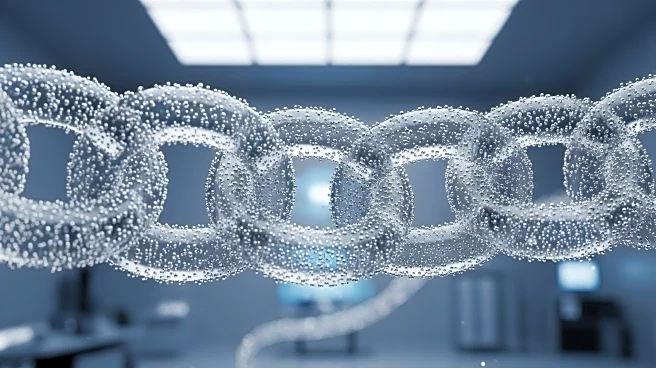What's Happening?
Researchers at Jilin University in China have developed a method to enhance the strength and processing ease of plastics by incorporating nanoparticles. This approach addresses the longstanding challenge in plastics manufacturing known as the 'plastics trilemma,' where improving one property often compromises another. By mixing polystyrene nanoparticles with common plastics like PEMA and PVC, the team achieved materials that are significantly stronger and easier to work with. Computer simulations revealed that these nanoparticles redistribute within the material under stress, allowing for smoother deformation and easier flow when melted. This innovation could revolutionize applications requiring lightweight, strong, and tough materials, such as automotive and aerospace composites, sustainable packaging, and biomedical devices.
Why It's Important?
The development of stronger and more easily processable plastics has significant implications for various industries. Enhanced materials could lead to more durable products, reducing waste and improving sustainability. The ability to scale this technology using existing industrial processes means it could be rapidly adopted, potentially transforming sectors reliant on high-performance materials. Industries such as automotive, aerospace, and packaging stand to benefit from reduced material costs and improved product longevity. Additionally, the environmental impact of plastics could be mitigated by creating more recyclable and sustainable materials, aligning with global efforts to reduce plastic pollution.
What's Next?
The researchers plan to further explore the scalability of their nanoparticle-enhanced plastics and their compatibility with existing manufacturing processes. This could lead to widespread adoption across industries, driving innovation in product design and sustainability. As the technology is refined, it may also open new avenues for research into other applications of nanoparticles in materials science.
Beyond the Headlines
The use of nanoparticles in plastics raises questions about the long-term environmental impact and safety of these materials. While they offer benefits in terms of strength and processing, understanding their behavior in natural environments and their potential effects on ecosystems will be crucial. Ethical considerations regarding the use of nanotechnology in consumer products may also emerge, necessitating regulatory frameworks to ensure safe and responsible use.











